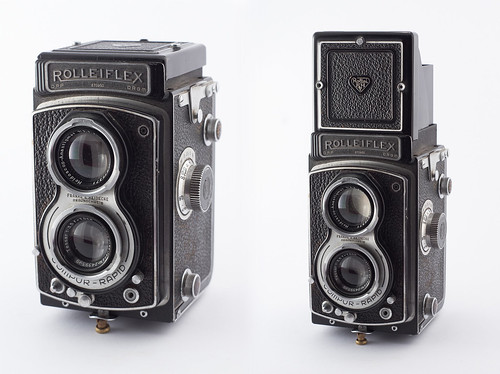Rolleiflex New Standard

|
| Rolleiflex New Standard image by -RobW- (Image rights) |
The Rolleiflex New Standard is a medium format TLR camera manufactured by Franke & Heidecke, Braunschweig, Germany.
General
Franke & Heidecke did perceive that there was a big price gap between the Rolleicord and the Rolleiflex Automat at that time (1938).
To fill that gap they decided to design and produce the Rolleiflex New Standard.
To cut costs the automatic film start sense mechanism was abandoned and instead the earlier way used, a red window at the bottom to visually search the first film frame on the films paper backing.
Also the front mechanisms was simplified and no longer showed the aperture/speed wheels as used on the Automat but used levers alongside the shutter as on the Rolleicord.
Still other cost savers were the use of a viewing lens with an aperture of 3.1 instead of the Automats 2.8 and the ommitment of the selftimer.
Specifications
- Rollei internal name : K6, build 640
- Production period : 1939 to 1941
- Format : 12 exposures of 6 x 6 cm on 120 type rollfilm.
Furthermore a Plate adapter for sheet film and a Rolleikin adapter for 35mm film cartridges can be used. - Taking lens: Carl Zeiss Tessar 1:3.5 f=7.5cm
- Viewing lens: Heidoscop-Anastigmat 1:3.1 f=7.5cm
- Filter Bayonet : Both lenses, size 1.
- Parallax error correction.
- Shutter: Compur-Rapid CR00 leafshutter. Speeds 1 to 1/500 sec. and B.
- Flash synchronisation : None
Sometimes X synchronisation added by an after-sales factory service - Double exposure prevention
- Color Laqcuer : Black
- Color Leatherette : Black
- Dimensions WxDxH: 92 x 95 x 140 mm
- Weight: 900 grams
Bibliography
- Claus Prochnow, Rollei Report 1, Braunschweig, Lindemanns Verlag, 1993, ISBN 3-89506-105-0.